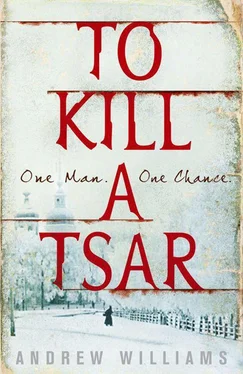A footman helped Dobrshinsky into his coat and handed him his hat. A carriage was waiting on the street to take him to Fontanka 16 but he lingered in the count’s hall with an amused expression on his face. The pianist was still rehearsing for the soirée but he was now playing with seditious passion Chopin’s ‘Revolutionary Etude’.
OCTOBER 1880
The weeks Anna Kovalenko was to have spent in Kiev became months. The empress passed away, the emperor married again and the trees in the Tavrichesky were autumn oak brown, the birch and larch a rich yellow, by the time she was summoned to the capital once more. They had been lonely months, but months of activity. Student meetings, factory committees, speaking to the party’s programme, and always only one step ahead of the authorities. While she had been away The People’s Will had changed almost beyond recognition. Many old comrades had gone, arrested on information supplied by Goldenberg. In confusion and fear the party had become lethargic, its time and funds spent replacing those awaiting trial in the House of Preliminary Detention. The revolution seemed no closer than it had ever been and the death sentence against the tsar no more than an idle threat. Comrades with experience and fire like Anna and Vera Figner had been summoned back to the capital.
The printing family had abandoned the apartment on Podolskaya, after a neighbour began to grumble of strange banging and shunting noises, and rented rooms at the less salubrious end of the same street, close to the open sewer that was the Obvodny Canal, a stone’s throw from the gasworks.
Praskovia Ivanovskaia was in charge of the press now and there were new faces and new rules: no one to write or receive letters, no contact with other party members, no meetings, no social gatherings. ‘Things are so bad, Anna, dear. Alexander Mikhailov is trying to prevent more losses.’
The executive committee was fortunate in Praskovia, for she obeyed without question. She was the daughter of a village priest and there was something of the religious ascetic in her manner and appearance. She had a plain face with dark hair that she dragged off her forehead and tied in a tight bun, short-sighted, with spectacles on a chain, a large mouth that turned down a little at the corners. Although she was only twenty-seven years old she dressed in black like a widow twenty years older. No one was prepared to sacrifice more for the party, and she was baffled when others did not show the same stubborn loyalty.
‘Olga has left Russia with Morozov,’ she told Anna when they were alone together in the apartment for the first time. ‘They’re living in Switzerland as if they were man and wife.’ She paused and leant forward to stare at Anna. ‘What is it? Why are you smiling?’
‘Olga used to say nothing should come before the party.’
‘And Morozov used to talk about the revolutionary spirit, the need to give up selfish love.’
‘Perhaps Olga can’t help herself,’ Anna replied quietly.
‘But it’s selfish. We pledged our love to the people and the party…’ Praskovia hesitated, but could not check the resentment that had been building inside her for months. ‘Things are not what they were, Anna. No one cares. Look at Sophia and Gesia Gelfman too. We used to be brothers and sisters… it’s sapping the will of the party.’ She closed her eyes and shook her head crossly: ‘It’s wrong.’
‘You don’t mean Sophia Perovskaya?’
‘Yes. Our Sophia. She’s sharing an apartment — a bed — a few streets from here with that bear Zhelyabov.’
Sophia Perovskaya. Anna’s friend Sophia. Sophia, the perfect revolutionary. The Sophia who instructed her to leave Petersburg because she was too intimately involved with a man. They had all been so quick to preach, and she had wounded someone she cared for very deeply. If she had asked them why it was so very different for her they would simply have said he was ‘not one of us’. And she would have been forced to admit they were right. She tried not to think of him because looking back could serve no purpose. In her months of exile she had come to a quiet acceptance that she would be ruled by the party in all things for the good of the people.
It was Anna who found the cheese shop on the Malaya Sadovaya. A respectable address that would meet the party’s needs perfectly. The other premises in the street were occupied by smart residential blocks, prosperous merchants and the better sort of taverns. It was on the corner with Italyanskaya Street, only a few yards from the blue and white Petrine building where the chief prosecutor’s clerks prepared cases for trial.
On a blustery autumn afternoon, a sharp northeasterly chasing leaves along the street, she visited the building with Andrei Zhelyabov, rousing the dvornik from post-prandial slumber. A basement with a shopfront and counter, a living room and vaulted cellar, clean, a little damp, annual rent twelve hundred roubles. Subject, of course, to the usual police checks.
They made their report at a secure apartment on Voznesensky Prospekt the following morning. The sitting room was cramped and stiflingly hot and most of the executive committee was forced to sit on the floor. Alexander Mikhailov presided in one of the chairs. He nodded curtly at Anna but offered no sort of welcome. He had put on weight, the buttons of his waistcoat under strain, his beard not full enough to disguise the roll of flesh beneath his chin.
Vera Figner called to her, ‘Annushka,’ weaving across the room with her arms outstretched in welcome. And a moment later Sophia Perovskaya was at her side, reaching up to kiss her cheek.
‘I’ve missed you, Annushka. So much has happened while you were away.’
‘Yes. I’ve heard a little.’
Sophia noticed her smile of amusement and blushed. ‘We’re very happy,’ she said, glancing over to Zhelyabov.
‘And I’m happy for you, Sonechka,’ Anna replied.
‘Are you?’
‘Of course.’
Sophia leant confidentially close: ‘I’m not sure everyone feels the same way.’
She was on the point of saying more when Mikhailov clapped his hands and called the room to order. Zhelyabov was the first to speak, his back against the wall, gesturing animatedly, a powerful passionate figure: ‘We’re all agreed on this new campaign, I know. And we’re agreed that our best opportunity will be when the emperor is returning from the Sunday parade.’ Stepping to the table, he picked up a simple hand-drawn map of the city and held it up for them all to see. ‘The escort usually leaves the Mikhailovsky Manège and travels down Malaya Sadovaya, turning right on to Nevsky. But it can return to the palace along the Ekaterininsky Canal too. We will never know which way it’s going to go. If we want to make sure we must use grenades.’
A bombing party would move into position as soon as it knew the route, he explained; three bombers at intervals in case the first grenades failed to explode or missed the target: ‘There is one drawback…’
‘…the bomber doesn’t stand a very good chance of escape,’ Sophia said, completing his thought. He nodded slowly, a reflective frown on his face.
‘And who do you propose would lead this bombing party?’ Mikhailov asked quietly.
‘Me,’ said Zhelyabov with a shrug of his broad shoulders. ‘I can’t ask anyone else to do it.’
An uncomfortable silence settled on the room. Zhelyabov began rolling the map as if no debate were necessary. Sophia stared at him, her small round face stiff and impassive, but her hands turning in her lap. It was Mikhailov who spoke next.
‘I think we should consider the other option.’ He turned to Anna. ‘You’ve found a shop that might meet our requirements?’
Читать дальше












